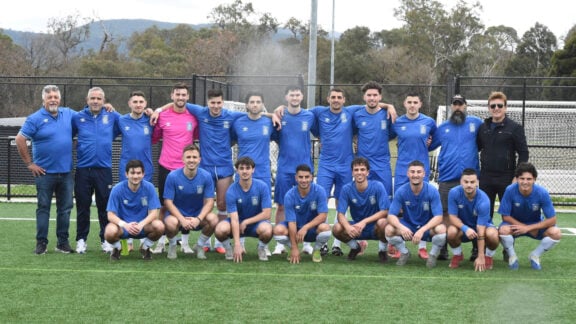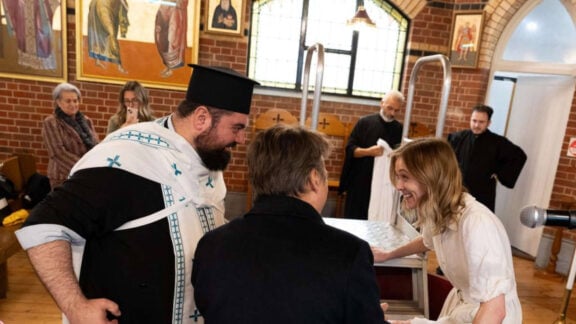After more than thirty-five years, Nick Apostolidis, a director of GHD – one of the largest engineering and infrastructure consultancies in the world, is bringing the curtain down on a remarkable career.
After being taken on as a junior engineer by the Australian engineering company in the early 1970s, Apostolidis’ rise as an entrepreneurial engineer is one of the great Greek Australian success stories.
His story, like most migrant high-achievers, is one of humble beginnings and a commitment to repaying his parents’ courage and investment in crossing the world to begin again.
The eldest of two brothers, Nick was born in Lemos in the Florina region of northern Greece in 1954. A hamlet of less than 300 people, Lemos – pressed up to the borders with Albania and the former Yugoslavia – offered Nick’s father little prospect of advancement for his family. Despite being the mayor with a small farmstead, Kosmas Apostolidis knew that his family’s fortunes lay overseas.
In 1963, Nick aged 9, and his brother George age 7, arrived as the advance guard with their mother Anastasia in Melbourne. The early years are still vivid.
“Coming from a small mountain village to a very urban Carlton was a bit surreal,” says Nick. “It was strange but exciting. We’d never seen so many cars before.”
A naturally-gifted child academically despite his lack of English, he acclimatised quickly.
“As the eldest son I’d sit with my father and listen to the news and translate it for him. So I learned the issues of the day and the language at the same time,” says Nick, who in his first test at primary school got half out of 10 for spelling and 10 out of 10 for arithmetic.
As he recollects his early days in Melbourne, he admits much of his professional motivation relates to his parents’ experience.
“It’s an inspiring story what they did, what many migrants’ parents did. It’s always stuck with me – that determination. I always believed that effort of our parents should not go to waste”.
By the time high school arrived he knew he wanted to pursue a career as either an architect or an engineer.
Monash University followed where opted for civil engineering – a profession which he says “is about making life easier for the community”.
And it was with an honours degree in that discipline that in January 1977 he joined GHD – a company founded in Victoria in the 1920s as a small consultancy serving country towns in water and sewerage services.
From small acorns great oaks grow.
Today GHD – based in Brisbane – is an international network of engineers, architects and environmental scientists serving clients in the global markets of water, energy, environment, property and transportation.
Employing more than 6500 people across five continents, Nick has played a central role in its evolution and commercial success.
A defining moment in his career he says, was when he spent a year early in his career in San Francisco as part of an exchange scheme with a US water company.
“I was in awe of this organisation,” says Nick. “They were one of the biggest water consultancies in the world. I thought ‘these guys must be so much smarter and advanced than us’, but what the experience showed me is that we could match it with the best of them.”
Nick and his wife returned from San Francisco in 1985 with “a 30 kilo laptop”, his first son, and an enormous amount of self-confidence.
The US experience enabled GHD to win contracts with the major utilities in Australia who were undergoing sweeping corporatisation – turning them effectively into private entities.
“What happened was that those utilities transferred their design and construction functions to us,” says Nick.
Today, GHD’s water management business covers collection and treatment, flood protection, irrigation – the whole gamut, and is responsible for designing some of the biggest dams in the world.
“It’s the full cycle,” says Nick, who is based in Brisbane. “A raindrop falls in the catchment, how you then take it, treat it, prevent it from polluting before you release it back to the environment.”
The company is currently involved in one of the biggest damsin Australia – the 90 metre high Cotter Dam that will supply Canberra for the next 50 years.
Part of GHD’s portfolio of specialities is the development of desalination plants.
“They’ve been controversial here but their critics suffer from very short-term thinking,” he says.
“You need a proportion of your supply to be climate-independent. That’s what desal plants provide.”
Whilst in the early days GHD was involved in nation-building, Apostolidis and his colleagues’ work is now at the forefront of dealing with climate change – not just in Australia but across the world.
“Global warming impacts the availability of water and Australia has one of the most variable climates on earth,” says Nick.
“We’re the canary in the coal mine. Australia is an example to other places in the world -which have more stable climates – of what they will experience as the planet gets warmer.”
Under Nick’s watch GHD became a world leader in creating sustainable solutions for water infrastructure.
“One of the reasons we’ve been successful overseas is the rest of the world thinks what we’re doing about climate change here is a good example,” says Nick.
“It’s not just about desal plants. Australia per capita has been one of the highest users of water, but we’ve been able to trim it down to very low levels compared to the US and Canada for instance.”
12 years ago Apostolidis was given the task of developing the water management side of GHD globally. As he did so, he increased the company’s turnover – in that sector alone – from $40 million turnover per annum to $300 million. In 2011-12 the company as a whole turned over $1.1 billion.
Nick will retire officially at the end of March – delivering on a promise he made to his wife Helen to retire before he was 60.
“In my career I spent a lot of time away, to some degree at the expense of the family,” says Nick.
Though a keen golfer, he’s not about to simply relax, play a few rounds and take it easy.
“I feel I need to give something back. I’m interested in working with Indigenous communities to see what I can do to help.”
He’ll also stay on the boards of Water Australia and the Australia Green Infrastructure Council – not-for-profits that promote Australia’s water capability to the world and sustainable infrastructure.
And there’s one last project, dear to his heart, to complete. He’ll do it with younger brother George – the celebrated Melbourne-based commercial photographer.
“Our parents were refugees from Asia Minor. Our grandfather on dad’s side was an orphan from Pergamon near Smyrna. He was relocated to a village in what is now Albania.
“On mum’s side they were from Pontos. Their whole community – lock, stock and barrel was relocated to the province of Kastoria in the 1920s.”
With elderly Aunts still alive in Greece, Nick and George hope to put the last pieces of their family’s jigsaw in place.
“Just before our father died, we spent many days with him, and he started to open up in a way that he never had before about those times.
“We’re going back to the village in Albania and to Turkey. It’ll be good to see – a kind of closure.”
Nick Apostolidis’ illustrious career with GHD may be complete but a new journey is about to begin.
Advertisement
Apostolidis’ journey
Nick Apostolidis has played a vital part in the evolution of one of Australia’s most successful companies, but in retirement he’s planning perhaps his most important project ever









